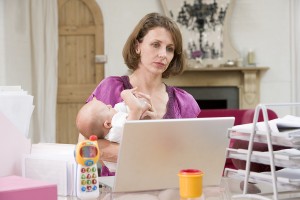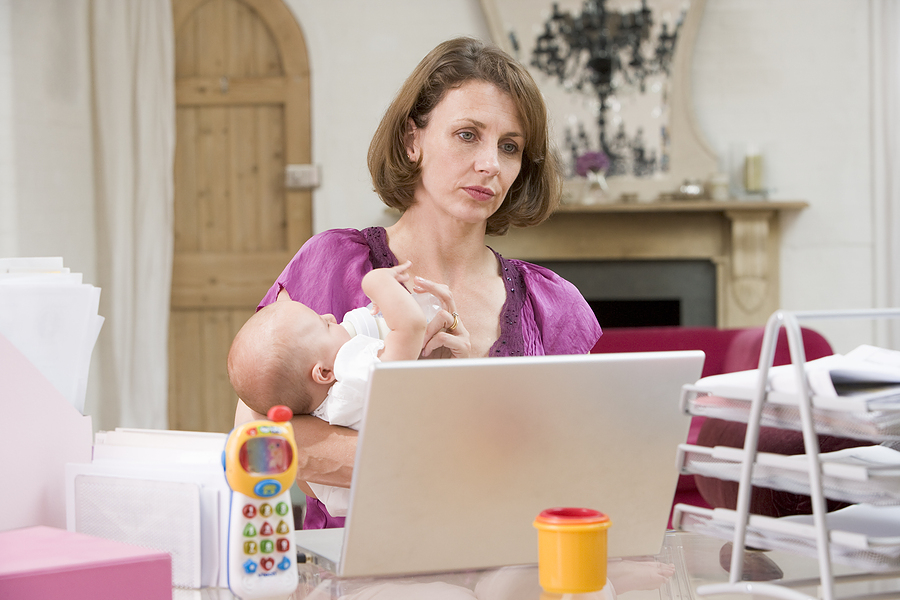Over half of all working mums earn less than they did before they had children, finds a new survey. Partly this is due to women cutting their hours to fit in with family life – or even taking less paid jobs because they can still be there for their kids. 
This confirms what many mums already know – it is very hard to put as much into a job once you have kids – and even if you continue with your career path you have to factor in childcare costs, which are often incredibly high.
From my own experience as a working mum, it can become harder to work full time as your children get older. Commonly new mums believe that things will get easier as their child grows up, but while it can be easy to drop one little baby off to be looked after by granny, it becomes much harder once you have two or three older children. I found having one baby easy – which was why I was lulled into having the next two within two years!
I soon discovered two children is much harder work than one (and they don’t necessarily amuse one another as you hope!) and then two boisterous sons and a daughter who only wants mummy or daddy made working full time a real challenge. Someone needs to pick those children up from school – and often if you have several children they will finish at different times or want to go to after school activities. Then schools themselves are quite demanding. As parents of three, my husband and I always seemed to be taking time off, going to something connected with one of them.
This doesn’t also take into account that there is always something happening with one child – one always needs a trip to the dentist, one is off colour and needs you to stay at home, one needs extra help with a project. Then there was doing three packed lunches, sorting Christmas and birthdays for three (these occasions always seemed to come round incredibly fast).
So it’s not surprising that working flexible hours was seen by many families with young children as a way to work around family life. But has it worked and could employers help more?
According to workingmums.co.uk’s annual survey only 20% of working mums’ partners work flexibly despite the fact that legislation on flexible working applies equally to them.
Four per cent of partners worked part time and 16% had some other kind of flexible working arrangement, according to the survey of over 2,000 working mums.
The figures show that it is still overwhelmingly women who are seeking flexible working in order to balance family and work responsibilities despite moves to encourage shared parenting and despite the fact that over 35% are the main breadwinner (up 5% on last year).
Flexible working was the most important factor helping women get back to work after maternity leave or a career break and a lack of new flexible jobs was the single biggest barrier they faced.
That was even though 62% were willing to accept a less well paid job in return for more flexibility. Indeed, 58% were earning less than they did before they had children.
Childcare was still another major barrier for women returning to work after a career break. Some 59% of working mums said childcare costs were a factor in stopping them going back to work. Many were getting around the problem by asking their own parents to look after their children. Some 48% used grandparents for childcare, up 5% on last year.
Recession
The survey shows the career penalty women are paying by not going back to work. Some 53% of those who had taken a career break to bring up children said they could not find a job in their field. Only 10% found a job in their field quite easily.
The economic recession had also had an impact. Some 40% of mums said they had gone back to work earlier than expected because of cuts and the rising cost of living. And 54% thought employers were discriminating more against mums in the current economic climate. Some 29% of those who had been made redundant recently said that they felt it was linked either to their pregnancy, maternity leave or being a working mum.
The survey also asked women about whether they had considered setting up their own business to get greater flexibility. Sixty-two per cent had done so with 29% saying they were working on a business plan and were in the early stages of setting up a business. The biggest barrier they faced was access to funding.
Other findings were:
– 56% of working mums were looking for part-time jobs, but asked what kind of flexibility they rated very important 77% said flexi hours, compared with 61% for part-time hours
– Asked what made for a family friendly employer the majority said offering full-time flexible jobs
– Asked what would encourage them to work full time, 76% said homeworking part of the time
– 43% of working mums said they would consider sharing their maternity leave with their partner
– Most working mums who went back after maternity leave did so on a part-time basis (55%)
– 29% described their employer as not very flexible or inflexible, but the majority said their employer was flexible, with 12% describing them as extremely flexible. The number describing their job as flexible, very flexible or extremely flexible was up 2% on last year.
Gillian Nissim, founder of Workingmums.co.uk, a jobs site for professional women with over 22,000 candidates registered, said: “Our survey shows that, while the majority of women are happy with the flexible working they have, there are still a significant number working for employers who seem resistant to new ways of working. Although we welcome the Government’s recent announcement on extending flexible working and enabling shared parenting, our survey shows there is still a long way to go to change our work culture so that both employers and employees benefit from smarter working practices. This has to begin with greater emphasis on spreading good practice from those employers who can see the advantages in terms of higher retention rates, greater productivity, happier staff and reduced overheads.*”
*Workingmums.co.uk has just announced the winners of its Top Employer Awards which aim to promote best practice in family flexible working. See http://www.workingmums.co.uk/topemployerawards/
Can women have it all? Let us know your views below…



